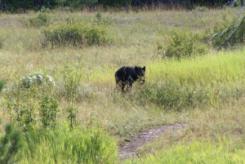Dear Friend,
During my family’s time here in western Canada, we have noticed some subtle, and not so subtle, “cultural” differences between the people of my home town in Virginia and the people here.
First, what shines out about the people of both places is the basic decency and gentle kindness that I find in people all over. Practically all of the people that we have interacted with personally have been both pleasant and helpful.
We have always heard that Canadians are famous for their politeness, and their courtesy. In our travels in eastern Canada, this reputation held up well.
However, in western Canada, perhaps because of this reputation, we have been surprised to run into a rather strange phenomenon of aggressive middle-aged male drivers in pickup trucks. Yes, these guys in pickup trucks seem to have no turn signals, move around other traffic like it is a fixed object, and otherwise just chip away at the old courteous-driving reputation of Canadians generally.
Being the overzealous researcher that I am, of course I did some Internet research at our next campsite on this subject of “discourteous western Canadian drivers.” Believe it or not, I found a recent survey that supported our findings. Apparently, Albertans were more likely to agree with the statement that, “Aggressive driving is on the upswing,” than folks from any other area of Canada, while people surveyed from the Atlantic Provinces (the area of Canada that we had last visited, where drivers seemed to us to be generally courteous) were least likely to agree with that statement.
Another phenomenon we have run into is the habit of folks to ignore, or at least to not acknowledge, strangers in their midst. We even experienced a few in-store body-to-body collisions where the other party just went on and did not say “Excuse me,” or whatever else might normally be expected in my home town. In some places, such a bump without acknowledgment might be considered a threat or a bullying act. This was not the case here. I have observed by myself several incidences with ordinary strangers where attempts to make casual eye contact or verbal “excuse me’s” and other courtesies were not acknowledged or were met with blank stares.
In these incidences I never saw intentional rudeness. In fact, whenever a person’s attention was successfully captured, people have been universally pleasant. It has been the casual, stranger-to-stranger interface, or rather the lack of it, that has taken us a bit off guard.
In my Internet research, I came across a document from British Columbia that was meant as a guide to Canadian culture for foreigners recently in the country. This document clearly talks about the importance of acknowledging strangers and using the courtesy phrases “please,” “thank you,” and “excuse me,” liberally. In fact, this document could have easily been re-labeled a “Guide to Virginia Courtesies.”
So I don’t really have an answer to this phenomenon. Perhaps I am observing a cultural shift that has not been fully recognized? That would be cool.
Nevertheless, the longer we spend here in western Canada, the more it becomes apparent to me that this cultural idiosyncrasy is at odds with the general cultural attitudes here. In fact, I think that most US residents, and especially those from one of the southern states like myself, will fit in quite well here.
As an example of what I believe is a truer reflection of the Canadian culture, I relate the following incident.
Last weekend we dropped our friend off at the Calgary airport around 5:30 a.m. so that she could catch her flight back home. She had been traveling with us but had to get back home.
We drove her to the airport in our RV, and when we arrived at the terminal we followed the traffic up a narrow, one-lane ramp to the “Departures” area. As we approached the drop off area, I happened to notice a walking bridge that crossed over this drive just beyond the ramp and in front of the airport, attaching the airport terminal to a parking garage.
Now, all measurements in Canada are generally listed in metric units. However, the City of Calgary apparently thought that the height listings posted on their bridge overhangs should also be in feet and inches.
So, as I drove up this ramp, and sleepily headed to the gate drop-off point, my eyes glanced up just in time to notice the printed “12 ft. 9 in.” on the fast approaching overhead walkway. I instinctively hit the breaks a few feet away, as my brain reminded me that our RV had an overall height of thirteen feet, two inches.
At that moment I realized several disturbing facts. First, we had just narrowly avoided a very close haircut and untimely removal of our two roof-mounted air conditioning units and TV antenna. Second, we were now trapped between a low-overhead bridge and a one-way, one-lane ramp that now boasted a continuous flow of early morning airport traffic. We were stuck. And good.
Our friend just bailed out and gestured goodbye as I contemplated how many tickets I was about to receive and whether we would all be on the nightly news for single-handedly stopping-up vehicle traffic at the Calgary airport.
However, despite having been asleep minutes before, my wife characteristically jumped up and out of the RV, flagged down a security person, and within minutes we were being courteously escorted the wrong way down the one-way up-ramp, and out of the airport.
We received no ticket. There was no posturing or threats. There was no passing the buck. There was just, “No problem, eh.”
The “problem” was solved and all was well. There was no measurable slowdown of airport traffic. No threats. It was painless.
I am certain that, back home, in some major city, some very bad, very tough, ex-special forces type who was working the streets of Kandahar last week would be dealing with me in a much less civil or friendly tone than I experienced here.
At our local, small-town airport in Virginia, I hope that I would have been treated well under similar circumstances. Nevertheless, even there I have had a run in with well-meaning but, in my opinion, way over testosterone-filled security personnel.
At the very end of my family’s “fun-filled,” multi-day, sleeping-in-airports return from Buenos Aires two years ago, I was verbally manhandled by several policemen at my home airport who made me feel like I was, at that moment, a student in today’s Tehran instead of simply a dad from an old and respected local family.
Totally exhausted as I was at that moment, I was not allowed to approach my car. I was told to keep my hands in sight. I was being eyed as if I might have a bomb under my crumply traveling clothes.
I still have no idea why these guys thought that I was so scary. In the end, they didn’t even charge me with anything. I wonder if perhaps they had watched too many Hollywood movies or had attended just one-too-many security briefings that prepared them for “worst-case” scenarios. Perhaps their hyper-vigilance was turning even casual interactions with ordinary people like me into that worst-case scenario, “just-in-case?”
Travel opens your eyes. No place is perfect. Good and bad is everywhere.
I have discovered that, by far, the good outweighs the bad, and the bad can generally be handled as long as you don’t over react to it.
If you watch the nightly news and think that, just maybe, those foreign countries are too dangerous to travel to, think again. Sometimes the most dangerous place that you can be is in your own backyard.
Talk to you again when I get a good Internet signal!
All the best,
Hugh
Like this:
Like Loading...
 Dear Friend,
Dear Friend, Dear Friend,
Dear Friend,
